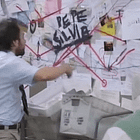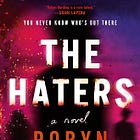New reading list, let's talk writing groups, and Happy 100th to Us!
In which we pat our backs and scratch yours with some recs and tips—hopefully!
This is our 100th post! How crazy is that! That milepost coincides with entering our third year as a Substack.
We wouldn’t still be around if not for wonderful contributors, authors who have done interviews with us, and readers who have supported us in many ways, from commenting to subscribing. Thankyouthankyouthankyou.
As someone who neglected her homework all through high school (and suffered bad grades as a result), I find it surprising that I am willing to assign myself additional homework in the form of a Substack. The reason I do it is to make myself think and read more—which clearly requires a deadline!—and to form and continue relationships with people like you, who are also interested in thinking and reading about books and film. Talk to us. Share us with your friends. Offer us a guest post on a favorite book or craft topic. We started Present Tense with the goal of growing a community!
Podcaster and Substacker Kristine Kimmel recently sent us our first question—thank you Kristine! To celebrate PT’s 100-post milestone, we’ll be answering it and providing some new resources for readers and writers.
Hello! I realize I have two questions. First: have either of you compiled a list at any point of your favorite/recommended suspense/thrillers? I have my own list going, but I'd love to pull from yours as I research/read. Second: how did you find your writing groups? I have left FB and I've been thinking it might be helpful for me to find a couple of other suspense/thriller/mystery (whatever my WIP is) to keep each other accountable/share struggles, etc...any suggestions?
THE READING LIST!
Caitlin, our lady of leisure (JOKE!!!1), was inspired to answer that first part with this new page dedicated to many of the books/movies we have mentioned, including links to the relevant posts.
HOW WE FOUND OUR WRITING GROUPS AND BETA READERS
Caitlin isn’t currently in a writing group that shares material, but she points out that many libraries have public groups open to new members, including the South Portland Public Library’s virtual group, of which she was once a member. She is in a “writing support group” organized by Donna Freitas, where writers make goals and meet regularly to check in and support each other.
Andromeda is currently in one group and until recently was in two. The first was thanks to Instagram connections (back when IG was a better place). The second was thanks to the Beta Reader Match-up done by Bianca Marais, co-host of the popular podcast, The Shit No One Tells You About Writing; Bianca’s next match-up happens in May. Info here. Try it!
The overlap between both approaches is this: I (Andromeda here, still talking to you) didn’t really know any of the people in either of those groups when they first formed, and yet in the end, I was pleased with the accountability fostered and feedback exchanged, and I was even more pleased to make new friends. For years prior to the pandemic, I complained about not having a writers’ group, thinking it needed to be in-person and with people I knew well, preferably writing in my subgenres. I’ve changed my tune on all that. Zoom makes writing groups easier, readers of other subgenres can still make smart comments about your subgenre (as long as they don’t hate it), and starting or joining a new one isn’t too big a risk as long as you give yourself permission to exit once it’s no longer useful.
If you can find only one person via social media, a public match-up, or the comment section of a bookish newsletter (including this one!) and that person finds one person, you’ve got three people. My best writing groups have had only three or four core members who produce regular work. Good luck! (And email me to let me know how it turns out.)
AND FURTHERMORE
This wouldn’t be PT if we didn’t run long, so I wanted to talk about why writing groups and beta readers (meaning, individuals who are willing to exchange partial or full manuscripts one-on-one) seem especially helpful for suspense and mystery.
(Though make no mistake—lots of suspense writers we interviewed share as little as possible, often with only a single trusted reader. We’ve got a whole post on that!)
When I write more literary or experimental fiction, I don’t necessarily like to let too many other cooks into the kitchen. At least not right away. (Exceptions made at times when I’m simply desperate for encouragement.) When I am writing something with a less traditional “engine”—a book that is more intentionally ambiguous, which may change its shapes many times before I’m happy with it, I don’t necessarily want criticism from day one. I’m also aware that even in finished form, the book doesn’t need to be understood by all readers in all the same ways. For example, my debut novel about a cellist, The Spanish Bow, was structurally modeled on Don Quixote. But no reader has to “get” that allusion in order to follow the story.
“But,” you ask, eyeing me with suspicion, ”isn’t literary suspense equally complex and ambiguous?”
Sometimes. But here’s my latest pet theory.
Given how many questions and puzzles exist within mystery and suspense on purpose, it can be especially important not to puzzle (i.e. confuse) readers accidentally. In the book I’m writing now, if my readers still don’t understand how two characters were murdered by late in the book, then I’ve made things needlessly complex. If readers get to the end and still don’t know not just the hows and the whos but the whys, I’ve failed. On top of that, if my readers actively despise my main character—the amateur sleuth—I’m going to have more of a problem than I’d have in a literary novel, where difficult or opaque characters are more easily tolerated.
Which is all to say: I do believe that suspense and mystery readers have more specific expectations than literary readers and I find feedback even more essential when it comes to suspense and mystery. Whether you’re the kind of person who wants feedback while you’re early in the drafting process, to inspire you to keep going, or only when you have a solid, revised draft—and then only from one trusted person—you can find or make a feedback system that works for you.
Thanks again to writers who have written us guestposts and cross-posts, see below. You’re the best!
(This email will be truncated in your inbox, due to its length, but visible in full by clicking on the headline and going to Substack.)
Donna Freitas on “How to Write a Sex Scene” (Cross-post.)
Jason Allison on “Not Knowing What You Know.” (Cross-post.)
Vera Kurian on “The Problems with Dual-Timeline Novels and How I Fixed Them. (Cross-post.)
Aside from writing, lawyering, teaching, and mothering.


















The reading list roundup page is such a great idea! I will be referring to that often, thank you.
Writing groups are so tricky to form but so magical when the right people come together. When I graduated from my MFA program in 2011 (haha, how? wtf is time?), I spent a while organizing and running some writing groups out of my local library to try and capture the workshop energy I was missing after grad school, but the vibes were always off. Specifically, people only showed up when it was their turn to be workshopped... that fell apart quick.
Around 2013, after I'd done Sarah Selecky's online writing course, I connected with a few of her other students and we formed an online writing group that met over Skype every couple of weeks for many years. It was so lovely!
Eventually, we disbanded (but stayed friends) and recently, another couple of writer friends and I formed a very loose writing support group. We meet up on a video call once a month to connect and talk about our plans. Then we check in regularly over text, share our wins, and also share where our plans fell apart. We can send pages to each other if we need readers.
My tips would be to ask around in your online writing courses or platforms where you're already connecting with like-minded writers. See who else is seeking a writing group, and once you have a few people (I agree with you Andromeda, 3-4 members is the sweet spot!!) set up your expectations and needs and get going! Writing people are the best people, and yours are totally out there!
I tried one of those Beta read matchup groups and...it was not a success. I wanted it to be but i guess writing-group lightning can't strike twice. I am currently in perhaps the best writing group EVAH. That list of writing articles is a delicious treat, thanks, and congrats on making it to 100!